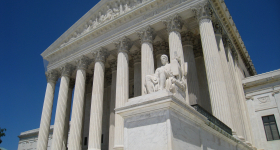Back in the depths of the election slough (it seems so long ago now!), Jeff Yang asked if Obama was going to be our first Asian American president, like Clinton was our first African American president.
No, of course Obama isn't Asian American, despite the Indonesian stepfather, the childhood in Indonesia, and the Asian American half-sister. I don't believe in "honorary" racial status, because it turns racial identity into a rewards system, with gatekeepers and authenticity meters. I don't want people dancing like monkeys for pointless cookies; I'd rather everyone be looking closely at the real differences and similarities in experience among different groups.
Which is why Yang's point was actually a good one: that Obama fit in with certain experiential and demographic trends that matched Asian American experiences and demographics better than African American ones. I hadn't read "Dreams from My Father" at the time of Yang's article, but I've read it now and I have to say: Yang was totally on the money in seeing the similarities between Obama's experience and that of a great many Asian Americans ... particularly multiracial Asian Americans.
Obama is:
- multiracial, which is not unusual in the African American community (you could argue that the African American community is inherently multiracial). But being the child of parents of two different official nationalities is far more familiar to Asian Americans.
- transnational, i.e. the child of parents who are of two nationalities, who grew up experiencing both those national cultures in some measure. In Obama's case, he had a mother in one country, a father in a second, and a stepfather in a third, but his transnationality is really between his American mother and his Indonesian stepfather. Asian American multiracials tend far more to be transnational than not, which is to say that the majority of Asian American multiracials are the product of parents of two different nationalities. This isn't true of African Americans, although it's becoming more common.
- bilingual (although who knows what he remembers of it now). Growing up partly in Indonesia and going to local schools there, Obama became bilingual. Bilingualism is an expectation we have of immigrant children of Asian American and Latino communities, and it's very often an experience of children of these communities, even when the bilingualism doesn't stick, i.e. if they lose their language skills early or their parents don't emphasize it.
- a third culture kid, which is a term that refers to children of expatriate parents who go abroad to pursue their careers, often in military, diplomatic, academic, civil or military contracting, NGOs, or business spheres. The kids are not immigrants, since the parents and children do not give up their citizenship and do not intend to stay in the foreign country permanently, usually because the foreign country is in the third world and the expatriates are from the first ... there's a distinct power dynamic here. The dynamic is that it is higher status for the child to be an American, so the parents are unwilling to let the child give up that cultural status.The "third culture" is what the child creates between the culture of the parent and the local culture of the foreign country.
Obama's childhood in Indonesia was a third culture experience, since he remained an American citizen under the protection of an American parent. This is an experience familiar to a number of Asian Americans and hapas, who go abroad with their parents -- sometimes to a parent's country of origin, sometimes not -- but under the protection of an American parent or of their own citizenship.
Yang's article says quotes Chris Lu saying that Obama is a "Rorschach test," but I think that's a little simple-minded. Obama is, in fact, a very 21st century American, who shares experiences with a number of people, mostly of his age or younger. These experiences are the product of late 20th century migration and demographic trends: the results of new immigration patterns to the U.S., of globalization of business, of American imperialism and the "international community" that has spawned, and of the disaffection of American baby boomers and gen Xers, who have taken their wealth and gone abroad in increasing numbers.
What makes his identity so multifarious is that he had to find an identity using the terms and concepts of 20th century identity-building, which is a mutually-incompatible system of seperate races. Keep in mind that it's only the 2000 census that allowed people to identify as multiracial. The other concepts -- transnational, bilingual, third culture -- aren't yet in mainstream currency as concepts, although increasing numbers of Americans of every race are sharing in these experiences. So Obama can, and has to, use the terms of 20th century racial identity building to communicate what he is to people. That's why he's called "African American," although the usual meaning of the term simply doesn't apply to him.
Obama isn't the only one. Look at Tiger Woods, Alicia Keys ... or Colin Powell. Actually, I could name about 20 public figures off the bat who are "African Americans" who share more demographically with Asian Americans than with the descendants of West African slaves in the United States. The point of all of this is that Obama isn't Asian American. He's an African American who is redefining what "African American" actually means. He's not deconstructing race, but rather redefining it, the way we all are, those of us who don't fit into the old categories.
I don't know what that means for the future, except that Obama is my president. He is the only political leader I've ever seen who truly represents not just my experience, but my point of view on domestic and foreign policy. This is a view that is shaped by knowing and understanding -- as only a child living across two cultures can -- that America is not the only country, that American ways are not the only ways, and that we as a nation and a people have much to learn from others. That's not so much where race breaks down as it is where race gives way to things that have more meaning.









Comments